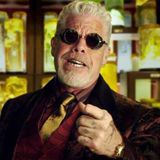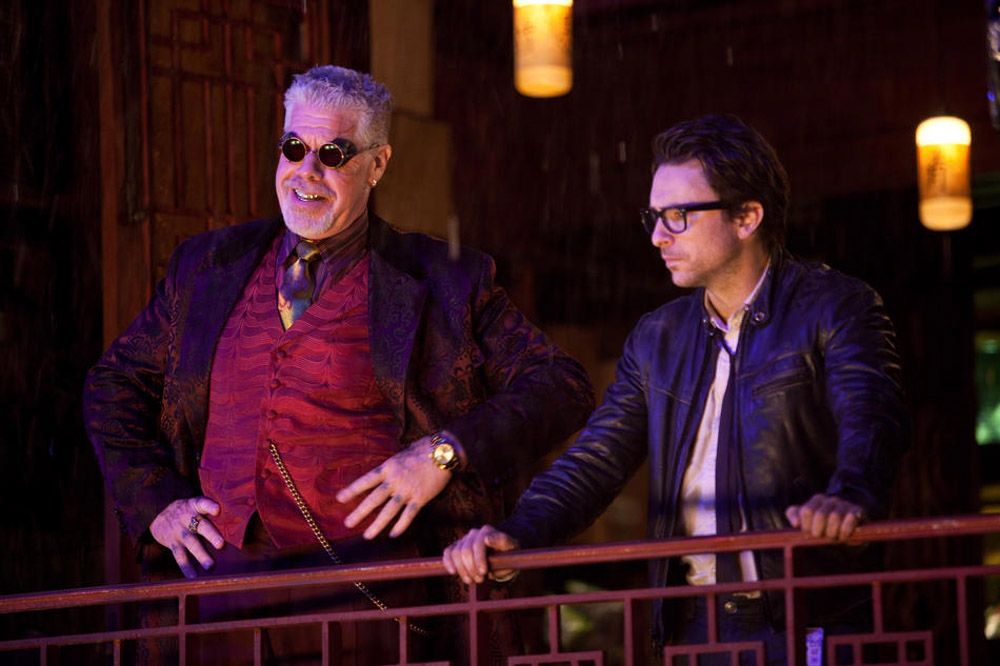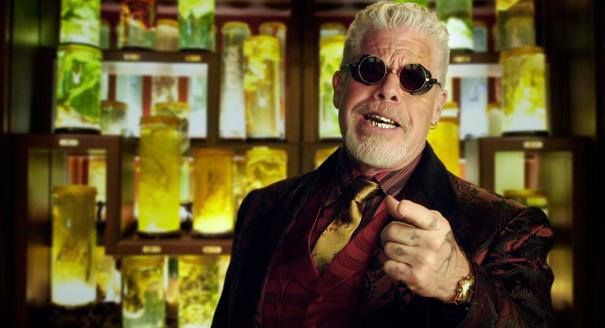If Guillermo del Toro has a good-luck charm, it might be Ron Perlman. The actor has appeared in five of the director’s movies -- including both his first, Cronos, and his latest, Pacific Rim – always contributing performances that are distinctive, and yet seem to epitomize the tone and approach the filmmaker wants to take with the material for each one. In Pacific Rim, Perlman plays Hannibal Chau, a war profiteer who becomes an unlikely partner for the scientists and soldiers on the front lines of a massive battle between alien monsters and the robots humankind built to defeat them.
Spinoff Online sat down with Perlman at the recent San Francisco press day for the film, during which the actor offered some insights into that longstanding partnership with del Toro, even after we feebly attempted to make a joke about it. Additionally, he discussed the ease with which he figured out Chau, and reflected on how playing the variety of roles he’s tackled thus far is at once a great source of satisfaction and the tip of a much larger iceberg he’s still eager to explore.
Spinoff Online: You do a great job in the movie. What was it like working with Guillermo for the first time?
Ron Perlman: Oh, well the first time I worked with Guillermo was 1992.
Of course – I’m kidding.
But I still remember what it was like, if you want to go there.
Sure, by all means.
It was this like instant family – just add water and stir. The moment I met Guillermo, within 15 minutes, it was as if it was 15 years, and we had an immediate shorthand, an immediate kind of recognition. We both worshipped at the same shrines, we both had the same heroes. And we both had the same kind of self-indulgent proclivities towards loving food, so we spent most of our hang-time being foodies and eating our way through life. So there was this ease, and there was something about the way Guillermo kind of fashioned characters that fit into what he saw as my skill set. So he’s provided me with the best acting opportunities I’ve ever been given – or among the best.
At this point, is it a foregone conclusion that when Guillermo starts a new project, you will end up in it somewhere?
It’s not a foregone conclusion. Most of his films that he’s made in English, I’m in, but he’s never going to put me in something that's not appropriate or that he hasn’t found a way to use as something that actually ends up helping the project. He’s too devoted to making the right kind of movie to do that. But he has this penchant for putting enough humanity into each of his films — you know, I’m kind of the comic-relief portion of Pacific Rim, in a movie that is world-threatening and apocalyptic. So he’s always leaving himself a wide range of possibilities to find something for me to do, but I think there’s another couple of projects that he’s got on the books that I will not be a part of – and that’s fine. Because when the right one comes along, I’m sure he will pick up the phone.
Your character exists sort of on the periphery of the central focus of the film. How much imagination did you have to bring to your character or the world given that so much of it was going to be created later?
I guess there’s two sequences where I’m looking at something that didn’t exist. So in those instances, you try to see as much sketching, as much design work as you can what you’ll be ultimately replacing in your imagination. But for the most part Guillermo insists on building as much practical parts of the set as he possibly can so that the stuff that he ends up drawing in later computer-graphically is more of an extension of something that actually exists rather than the replacement of something that was never there. And it makes it a lot easier on the imagination of the actor. For his Hong Kong set, he recreated four blocks of Hong Kong, and he had 500 extras and moving cars that were flying through the air. But that’s just his style. And I think it pays off, because I think there’s a kind of organic-ness when you see the stuff that’s painted in later on because it is part of something that is really there.
Hannibal Chau is obviously very colorful and flamboyant, but how did you define him and what sort of work did you do to develop him further?
Well, he’s kind of a guy who invented himself. He’s looking for a way in this world to satiate his unending appetites. He’s self-indulgent – he’s a complete hedonist. He loves dressing a certain way. He loves having the right wristwatch, the right car, the right plane. He’s that guy. So he doesn’t have a particular moral compass, and he doesn’t have a particular set of political affiliations or idealistic affiliations. He’s just a war profiteer, and he doesn’t even make a judgment call on the number of lives he’s stepping on in order to serve his insatiable financial needs. So he’s a pretty superficial guy, but he’s also very theatrical, because the choice to have Ron Perlman play a guy named Hannibal Chau, right there you’re making a decision up.
You could use a lot of those descriptions for your character in Drive as well. Do you feel like these characters demand the same kind of work as someone who’s maybe more understated?
Hannibal Chau was a walk in the park compared to some of the other stuff I’ve done with Guillermo. The two Hellboy movies, those were heavy lifts. I mean, I was working probably how Charlie Hunnam had to work in Pacific Rim. He’s the heart and soul of the film. He’s the hero who’s operating those Jaegers. He spent 12 hours a day doing these physical things that ultimately ended up messing him up because they were so challenging. In this movie, he was Hellboy, and I was the guy who provided a little local color – I came in for a couple of weeks, did this little performance, drank tea with my pinky up in the air and went home. So I didn’t even break a sweat. I had a ball, though, because the character is so deliciously strange and unique and imaginative.
As much as this movie is meant to be a pure adventure, what do you think this says about where our world is right now? Does it have a larger commentary to make?
Well, no, I don't think it has a larger commentary to make, but I think what he set up here is that these are not countries versus countries. This is not one culture versus another culture. This is the entire world versus the threat of there no longer being a world. And so if there’s anything kind of unique about this particular apocalyptic movie, it’s the international flavor of it. It’s the fact that you have all of these phenomenal accents in the five or six leading roles coming from all parts of the world that are being forced to find the common good to salvage man’s existence.
What sort of opportunities are you looking for now? Do you feel like you have the chance to play as many different kinds of roles as you would like?
I just like the notion – I love being an actor, and I love throwing myself into the exercise of finding a different kind of humanity, that I use myself to kind of supply the tools for. So I’m the guy who wants to play every kind of character that he possibly can before they kind of nail the lid down and put me in the ground. I just played a woman, I played a transgender, so I can cross that off my bucket list. But the things that turn me on are smart, original, the kind you’ve never really seen before, things that I’ve never kind of played before. That’s when I’m happiest.
Pacific Rim arrives in theaters Friday.



